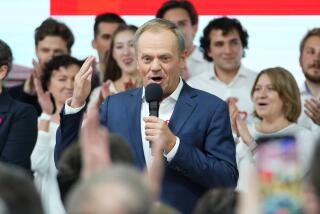Poland Says ‘No’ to Labor Pluralism : Tells Solidarity It Cannot Be One of Two Unions in a Factory
- Share via
WARSAW — The government today rejected the possibility of Solidarity co-existing with official unions in Polish factories, a stance that raises new doubts over whether a compromise can be reached on the outlawed union’s future role.
Government spokesman Jerzy Urban also said Solidarity could not use its name if it won the right to represent workers in a plant because the name is associated with a political movement.
Solidarity leaders flatly oppose the principle of only one union per plant amid fears that Solidarity would be co-opted by the government if it won a union election and were to be the workers’ sole representative.
At a news conference, Urban said a planned round-table meeting of representatives of the government, Communist Party and opposition groups--including Solidarity--will begin this month.
Solidarity leader Lech Walesa last week, in his first meeting in seven years with Polish leaders, won a concession that the revival of Solidarity will be discussed at the session.
‘It Is Ruled Out’
But Urban said the Communist Party will not agree to allowing two unions to co-exist at a single plant, saying, “It is ruled out.”
Walesa, who has called for the return of trade-union pluralism ever since Solidarity was crushed by martial law in December, 1981, reacted to Urban’s statement by saying, “I leave it for discussion at the round table.”
Other Solidarity leaders, most notably party ideologist Adam Michnik and Jacek Merkel of the 12-man Solidarity National Executive Committee, flatly oppose the concept of having Solidarity granted official status as the sole union at individual plants for fear of being identified with the government.
Urban denied that a 20-day wave of strikes that ended Saturday forced it to sit down at the negotiating table with Walesa.
“It is not true that the wave of strikes spurred the process of reconciliation,” he said. Instead, he said, both the political opposition and government “became wise” and decided a compromise must be reached.
Call for ‘No Confidence’ Vote
The official trade union federation, OPZZ, meanwhile, called on Parliament to issue a no-confidence vote in the government over its economic policies, which have led to two waves of strikes this year.
The federation also debated but overwhelmingly rejected a proposal that called for “protest action, including a general strike,” if the government does not resign.
“Up to now the causes of the strikes have not been removed,” OPZZ deputy chairman Waclaw Martyniuk said in a speech. “As long as that does not happen, there is a great chance for a new wave of strikes of even bigger scope.”
More to Read
Sign up for Essential California
The most important California stories and recommendations in your inbox every morning.
You may occasionally receive promotional content from the Los Angeles Times.









